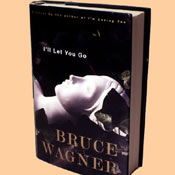
There’s a paranoid-schizophrenic street person in Bruce Wagner’s new novel who wanders the streets of Los Angeles under the impression that the year is “1840 or ‘60 or ‘80.” By the time you’re through with I’ll Let You Go, you’re likely to be suffering under the same delusion. High Victorian isn’t Wagner’s thing, of course; his TV series Wild Palms, and his first two novels, Force Majeure and I’m Losing You, are witheringly funny satires in the Nathanael West mode. But literate hipsters who are expecting up-to-the-minute inside jokes are in for a surprise.
Yes, the new novel is set in L.A. And yes, it likes to take swipes at the more la-la aspects of La-La Land. But I’ll Let You Go is essentially a Victorian novel. It’s a vast Christmas fruitcake of a fiction that comes complete with crotchety zillionaires with hearts of gold and abandoned brides and angelic poor people and clankingly contrived reunions and, most of all, an intrusive but amusing narrator who apologizes for the “admittedly shopworn” plot twists and never forgets to remind you just who’s in charge of this glittering puppet show. Wagner’s pastiche of Victorian clichés is brilliant, inventive, and entertaining – a welcome shift from straight satire. Yet for all the Dickensian detail and girth, there’s something hollow at the core – something more L.A. than London.
Like Dickens, Wagner is both a social novelist and a sentimentalist: He likes to shock you by juxtaposing the haunts of the very rich and the very poor, and then comfort you by showing that those worlds were secretly connected all along. I’ll Let You Go entwines with gleeful wizardry the endearing, eccentric Trotter clan, billionaires of Bel-Air, with a coterie of endearing, eccentric homeless people. The Trotters include a patriarch who’s endlessly commissioning designs for a tomb from the world’s leading architects; his drug-addicted daughter, Trinnie, a landscape artist abandoned on her wedding night; her son, Toulouse, our 12-year-old hero, searching for his runaway father; Tull’s cousin Edward, who suffers, à la Tiny Tim, from a disfiguring disease that can’t diminish his unmistakably Christlike goodness; and Edward’s mother, Joyce, who between Botox treatments provides decent burials for Dumpster babies.
Wagner’s poor may be even more colorful: There’s Will’m, the homeless, harmless schizophrenic giant who thinks he’s the nineteenth-century English designer and poet William Morris (get it?) and works, occasionally, for a kindly French pâtissier; his beautiful biracial ward, Amaryllis Kornfeld, an authority on saints; his deaf friend Jane, who abandons her baby – where else? – in a Dumpster; and so on, through nearly 600 giddy pages.
Even as the contrasts between the two worlds caress your sense of social outrage, the labyrinthine plot delights, for it goes without saying that all of the characters will turn out to be connected. Wagner’s ingeniousness with plot is matched by his cleverness with the recherché literary conceits – little touches that you can’t help admiring, like statues in a boxwood maze, even as you hurry past. Trinnie’s professional obsession with mazes and labyrinths, for instance, can be taken as a sly meta-comment on the nature of fiction itself: Both, after all, are entertainingly confusing constructs that you get lost in without suffering lasting harm. And a recurrent leitmotif of pomegranates reminds you of the myth of Persephone. Of redemptions, that is – if only partial ones – from dark underworlds.
And yet the redemption, the happiness here, feels a bit Teflon. The sentimental emphasis on cosmic and human goodness isn’t nearly as persuasive as the earlier books’ cynical astuteness about people’s fundamental badness. The happily contrived ending – something you might find at the center of the narrative maze – is there not because the author believes in it but because that’s what pseudo-Dickensian pastiche requires. “What fun it was being a writer!” one of Wagner’s characters exclaims here; it’s clear that the author is having a lot of fun, too. As is the reader. But a novel this dense should provide more than fun – here the journey you make is far more important than the destination you reach. Perhaps that’s Wagner’s allure: He cons people into confusing entertainment with edification. Which is, of course, the most Hollywood move of all. However amusing its ironic stance toward the culture it glitteringly mocks, the real irony of this peacock of a book is that it’s the ultimate Los Angeles product: a rip-roaring, special-effects-filled ride. It’s hard to let go of while you’re enjoying it, and just as hard to hold on to once you’ve finished.
I’ll Let You Go
By Bruce Wagner
Villard; 552 pages; $25.95.